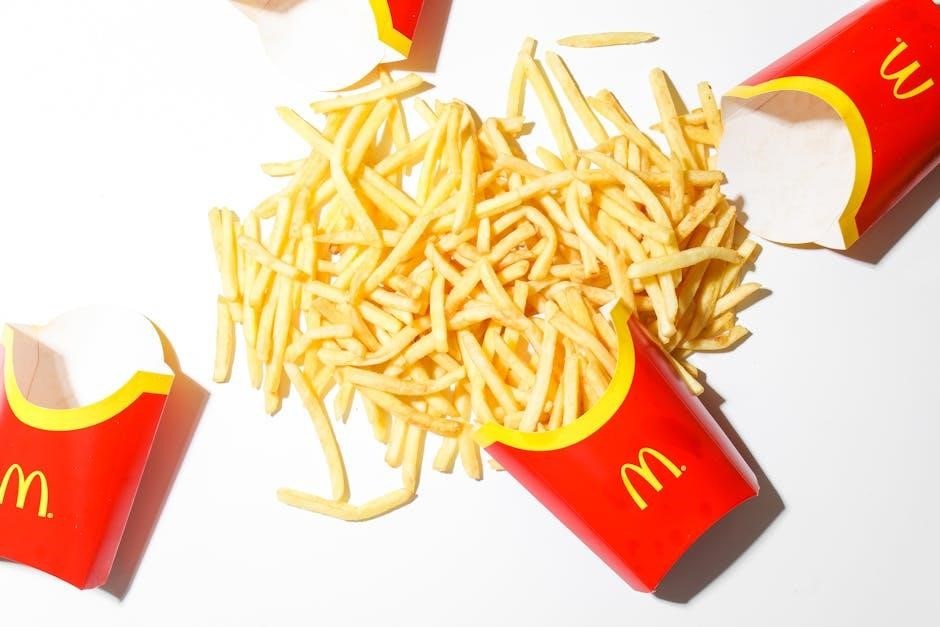A 500-calorie daily meal plan is a structured approach to significant weight loss‚ offering pre-planned meals and snacks to create a calorie deficit for fat reduction.
Overview of the Meal Plan
The 500-calorie-a-day meal plan is a highly structured diet designed to promote rapid weight loss through extreme calorie restriction. It typically includes a 6- or 7-day schedule with specific meal ideas for breakfast‚ lunch‚ dinner‚ and snacks. Each meal is carefully portioned to ensure the daily calorie intake remains around 500 calories‚ creating a significant deficit for fat loss. The plan emphasizes nutrient-dense foods‚ lean proteins‚ and low-calorie vegetables to maintain satisfaction and energy levels despite the restriction. It is often provided in a downloadable PDF format for easy reference and tracking.

Importance of Calorie Restriction for Weight Loss
Calorie restriction is essential for weight loss‚ as it creates a deficit that forces the body to burn stored fat for energy. A 500-calorie daily plan ensures a significant deficit‚ promoting rapid fat loss. By limiting intake‚ the body transitions to using stored energy‚ leading to visible results. This approach also encourages mindful eating and portion control‚ helping to establish healthier habits. However‚ it’s crucial to focus on nutrient-dense foods to avoid deficiencies and maintain energy levels during the diet.

Understanding the 500 Calorie Diet
A 500-calorie diet involves consuming only 500 calories daily‚ creating a significant deficit to promote weight loss. It includes structured meal plans with nutrient-dense foods.
How the 500 Calorie Deficit Works
A 500-calorie deficit creates a gap between consumed and burned calories‚ forcing the body to use stored fat for energy. This leads to weight loss over time.
Who Should Consider a 500 Calorie Meal Plan
The 500-calorie meal plan is ideal for individuals seeking rapid weight loss‚ particularly those with a significant amount of weight to lose or who have struggled with other diets. It is best suited for people who can commit to a strict‚ low-calorie regimen and are under medical supervision. This plan is also beneficial for those needing a structured approach to meals‚ ensuring they stay within their daily calorie goals effectively.
Safety Considerations for a Very Low-Calorie Diet
A 500-calorie diet may pose health risks‚ including fatigue‚ dizziness‚ and malnutrition. It is not suitable for everyone and should only be followed under medical supervision.
Risks Associated with Extreme Calorie Restriction
Severe calorie restriction can lead to health issues like fatigue‚ dizziness‚ and malnutrition. It may also cause muscle loss and nutrient deficiencies. Such diets are not suitable for everyone‚ particularly those with certain medical conditions. Prolonged use without medical supervision can harm overall health and metabolism. It is crucial to weigh the benefits against potential risks and consult a healthcare professional before starting a 500-calorie meal plan.
Consulting a Healthcare Professional Before Starting
Consulting a healthcare professional is essential before starting a 500-calorie meal plan‚ especially for individuals with medical conditions or those taking medications. They can assess suitability‚ ensure safety‚ and prevent potential health risks. A provider may tailor the plan to individual needs‚ addressing nutrient deficiencies or other concerns. This step is crucial for maintaining overall health and avoiding complications during extreme calorie restriction.

Benefits of a 500 Calorie Meal Plan
A 500-calorie meal plan promotes rapid weight loss and improves metabolic health by creating a significant calorie deficit‚ enhancing fat burning‚ and potentially boosting insulin sensitivity.
Quick Weight Loss Results
A 500-calorie meal plan accelerates weight loss by creating a significant calorie deficit‚ helping users shed up to 2kg per month. With structured meals like a 162-calorie breakfast and 291-calorie lunch‚ the plan ensures steady fat reduction. By adhering to the daily calorie restriction‚ individuals can achieve noticeable results within weeks‚ making it an effective option for those seeking rapid weight loss. Combining this diet with exercise further enhances results‚ helping users reach their weight goals efficiently.
Improved Metabolic Health
A 500-calorie meal plan promotes improved metabolic health by reducing fat stores and enhancing fat oxidation. The calorie deficit encourages the body to burn stored fat for energy‚ boosting metabolism. This plan also helps lower insulin levels‚ improving insulin sensitivity and reducing the risk of type 2 diabetes. By focusing on nutrient-dense meals‚ the diet supports overall metabolic function‚ leading to better energy levels and a healthier weight. Regular physical activity complements these benefits‚ ensuring sustainable metabolic improvements and long-term health gains.
Structure of the 7-Day Meal Plan
The 7-day meal plan provides a structured breakdown of daily meals and snacks‚ ensuring a 500-calorie intake with nutritious recipes and a shopping list for easy preparation.
Breakdown of Daily Meals and Snacks
The 500-calorie meal plan divides daily intake into balanced meals and snacks‚ ensuring nutritional value while maintaining the calorie deficit. Breakfast typically ranges from 100-150 calories‚ focusing on lean proteins and low-carb options. Lunch and dinner are allocated 150-200 and 200-250 calories‚ respectively‚ emphasizing vegetable-rich dishes and lean meats. Snacks‚ such as fruits or nuts‚ are kept under 100 calories. This structured approach helps users adhere to the diet while providing essential nutrients for energy and health.

Calorie Allocation for Each Meal
The 500-calorie meal plan allocates calories strategically across meals to ensure balanced nutrition and satisfaction. Breakfast typically ranges from 100-150 calories‚ focusing on lean proteins and low-carb options. Lunch is allocated 150-200 calories‚ often featuring vegetable-rich dishes and lean meats. Dinner‚ the largest meal‚ is set at 200-250 calories‚ emphasizing whole foods and fiber. Snacks are limited to 50-100 calories‚ such as fruits or nuts‚ to curb hunger between meals while staying within the daily limit.

Day-by-Day Meal Plan
The 7-day plan provides structured meals‚ with breakfast‚ lunch‚ and dinner options‚ each carefully portioned to meet the 500-calorie daily goal while ensuring balanced nutrition.
Meal Ideas for Breakfast‚ Lunch‚ and Dinner
Breakfast options include scrambled egg whites with spinach or a small bowl of oatmeal with berries. Lunch ideas feature salads with grilled chicken or tofu‚ and vegetable soups. Dinners suggest baked fish with steamed vegetables or turkey patties with a side of quinoa. Each meal is portioned to stay under 500 calories‚ ensuring balanced nutrition while promoting weight loss.
These recipes are simple‚ nutritious‚ and tailored to support a low-calorie diet effectively.

Low-Calorie Snack Options
Low-calorie snacks like fresh fruit‚ such as apples or berries‚ are ideal for curbing hunger. Baby carrots‚ celery sticks‚ or cucumber slices with hummus offer crunchy‚ nutritious choices. Protein-rich snacks like hard-boiled eggs or a small portion of Greek yogurt support satiety. For sweet cravings‚ a square of dark chocolate or a handful of almonds can satisfy without excess calories; These options provide essential nutrients while keeping calorie intake minimal‚ supporting the overall weight loss goal of the meal plan. Portion control is key to maintaining the 500-calorie daily limit.

Exercise and Activity Guidelines
Combine moderate-intensity exercises like walking or cycling with strength training to enhance fat loss and maintain muscle mass‚ supporting the calorie deficit created by the meal plan.
Recommended Physical Activity Levels
For optimal weight loss on a 500-calorie diet‚ incorporate at least 150 minutes of moderate-intensity exercise‚ such as brisk walking or cycling‚ weekly. Include strength training sessions to maintain muscle mass. Aim for 30 minutes of physical activity most days‚ combining aerobic exercises with resistance workouts. Tracking progress with apps like MyPlate can help balance calorie intake and expenditure. Consistency is key to enhance fat loss and overall metabolic health while following the meal plan.
Exercise Routines to Enhance Weight Loss
Incorporate a mix of aerobic exercises‚ such as jogging or cycling‚ with strength training to maintain muscle mass. High-intensity interval training (HIIT) is effective for rapid calorie burn. Aim for 30 minutes of moderate exercise most days‚ combining cardio with resistance workouts. Core exercises and flexibility routines can improve overall fitness. Use apps like MyPlate to track progress and stay consistent. Regular physical activity enhances fat loss and boosts metabolic health‚ supporting your 500-calorie meal plan goals.
A 500-calorie meal plan can lead to significant weight loss when balanced with regular exercise and medical guidance‚ promoting a healthy‚ sustainable lifestyle for long-term success.
Final Thoughts on the 500 Calorie Meal Plan
The 500-calorie meal plan is a highly restrictive diet designed for rapid weight loss‚ particularly effective for short-term goals. While it can yield significant results‚ it may not be suitable for everyone due to its intensity. Success depends on adherence to the plan‚ proper nutrient balance‚ and professional guidance to avoid health risks. Combining the diet with regular physical activity enhances outcomes‚ but sustainability post-diet requires gradual transitions to healthier habits. Always consult a healthcare provider before starting such a regimen to ensure safety and appropriateness for individual needs.

Maintaining Weight Loss After the Diet
Maintaining weight loss after a 500-calorie meal plan requires a gradual transition to a balanced diet and sustainable lifestyle changes. Incorporate nutrient-dense foods‚ portion control‚ and regular physical activity to prevent rebound weight gain. Tracking calories and macros can help monitor progress‚ while mindful eating habits ensure long-term success. Consider consulting a nutritionist to tailor a maintenance plan that aligns with your health goals and promotes overall well-being without extreme restriction.